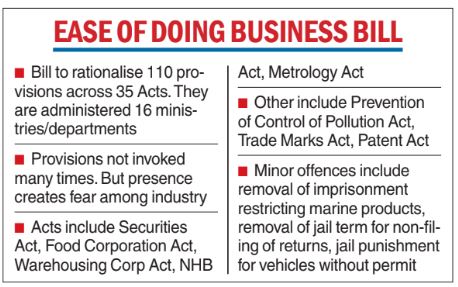The Department for Promotion of Industry and Internal Trade (DPIIT) will soon seek cabinet approval for a bill to decriminalise minor offences by rationalising related provisions under different ministries to ensure ease of doing business.
According to an official, the department is in the final stages to approach the Cabinet for The Ease of Doing Business and Ease of Living (Amendment of Provisions) Bill, 2022 as it is targeting to introduce the bill in the forthcoming winter session of Parliament. The bill proposes to rationalise about 110 provisions across 35 Acts administered by 16 ministries/departments. Explaining the rationale behind the proposed legislation, the official said that taking the reform agenda to the next level, the government is focussing on reducing the overall compliance burden for businesses and citizens.
For this, a four-pronged strategy — simplifications, digitisation, decriminalisation of provisions for minor offences and elimination of redundant laws/rules — has been adopted to deliver the desired objectives of this initiative.
“After a comprehensive consultation with all the key stakeholders, the department has finalised the bill and soon it will seek Cabinet nod on that,” the official added.
The DPIIT has received reports and recommendations from the industry bodies related to archaic criminal provisions existing in the laws.
“The bill seeks to decriminalise imprisonment provisions related minor offences to trivial procedural violations from 35 Acts. About 110 such provisions are proposed to be amended through this one bill. The department has observed that these provisions have not been invoked many times, but there is fear in the minds of industry about those provisions. The idea is to replace imprisonment with penalties or graded punishment,” the official added.

The initiative would also help in reducing the burden on the judiciary, the official said. These 35 laws are administered by various Union ministries and departments, including finance, food production and distribution, financial services, agriculture, commerce, environment, road transport and highways, defence, posts, electronics and IT.
The Acts include The Government Securities Act 2006, the Food Corporation Act 1964, the Warehousing Corporation Act 1962, the Factoring Regulation Act 2011, the National Housing Bank Act 1987, the Air (Prevention and Control of Pollution) Act, 1981, Legal Metrology Act 2009, the Trade Marks Act 1999, the Patent Act 1970, the Pharmacy Act 1948, and Indian Forest Act 1927.
The amendments are proposed to be subsumed through amendments under the proposed new legislation.
Citing some examples, the official said there is a proposal to remove imprisonment (up to six months) for trespassing or pasturing of cattle or permitting cattle to trespass in forest areas (Indian Forests Act); removal of imprisonment (up to one year) and retaining fine of Rs 5,000 for contravention of orders related to restricting or controlling import or export of marine products under Marine Products Export Development Authority Act, 1972; and removal of jail term (up to one year) and rise in fine from Rs 5,000 to Rs 25,000 for non-filing of returns, non-maintenance of record or register under Legal Metrology Act, 2009.
The amendment bill is also proposing the introduction of compounding offences for failing to make an application for registration and using a vehicle without permit under Motor Vehicles Act, 1988.
Earlier these offences had jail punishments of six months to one year and a fine of Rs 10,000 or 10 times the applicable road tax. A fine (up to Rs 1 lakh) is proposed to be converted into a penalty (up to Rs 10 lakh) for falsely representing that any goods sold is patented in India. In its report — Jailed for Doing Business — think-tank Observer Research Foundation has stated that among the 69,233 unique compliances that regulate doing business in India, 26,134 clauses have imprisonment provision as a penalty, which means non-compliance with two of five compliances can send an entrepreneur to jail.
Further, the official said that this bill is one of the initial steps undertaken to ensure a ‘trust-based governance’ and it is a continuous process to improve the business climate of the country.
“Businesses with no mala-fide intent which are caught in such offences due to omission, will have to suffer and run through a long judicial process before a final decision is made. The government is actively pursuing actions to ensure that businesses remain focused on doing business without any fear of imprisonment,” the official added.
As part of the groundwork on decriminalisation, departments assessed various acts and rules to identify contraventions of minor offences that carry criminal punishments like non-maintenance of books/records, requirement of whitewashing of canteen walls, provisions of spittoons in the factory premises. DPIIT has already taken several measures to promote ease of doing business and reduce compliance burden.











